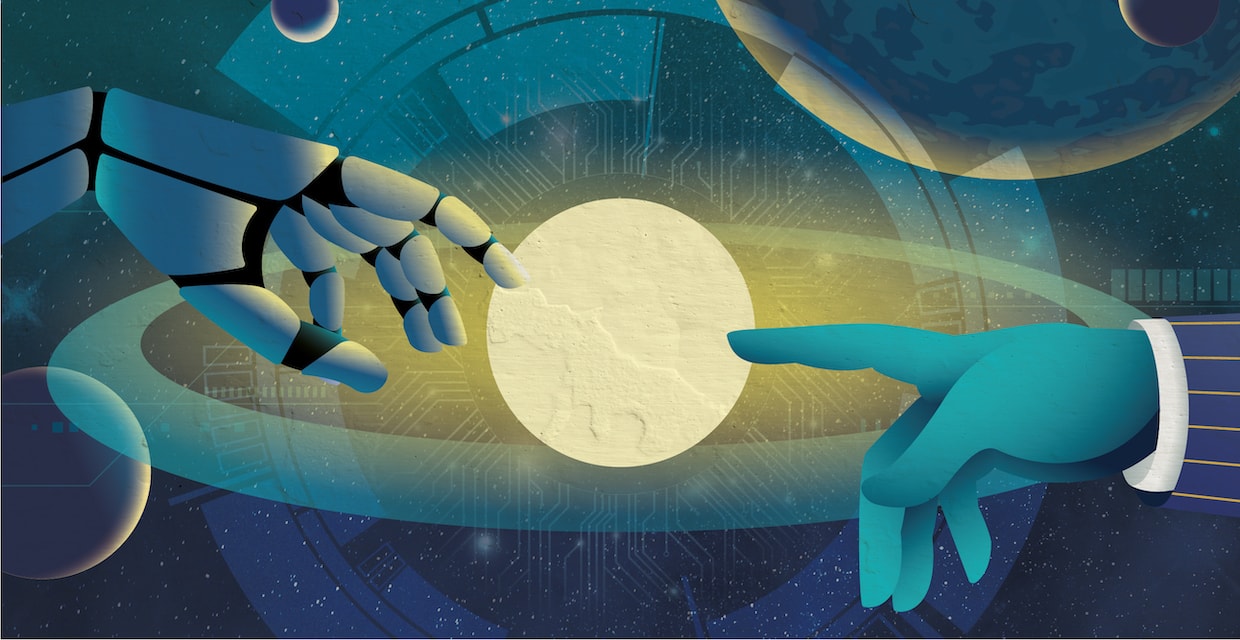How to Successfully Manage Google Reviews for Your Restaurant
We'll show you how important Google reviews are for your restaurant and how to best manage them.
What are the benefits of artificial intelligence in the hospitality industry? How can you use this technology in your business? Read about it here.

According to a study by McKinsey, an increasing number of companies are employing artificial intelligence in various areas. The use of this technology has more than doubled since 2017.
In the hospitality industry, use cases for restaurants, hotels, and other hospitality businesses are also increasingly emerging, which brings me to the topic of this Utopia Gastronomica article: possibilities and benefits of artificial intelligence for the restaurant industry. Here's what you can expect in this post:
It has been said that it is difficult to find a set definition of artificial intelligence (AI), because the term "intelligence" itself can't be clearly defined.
However, AI is often explained as follows: Artificial intelligence is a subfield of computer science that relates to the ability of machines and computer systems to perform tasks that would typically require human intelligence, such as processing information, recognizing patterns, or making decisions.
Another term frequently mentioned in connection with AI is machine learning. This is a subfield of AI that focuses on giving computers the ability to learn from data and experiences without being explicitly programmed for it.
We find examples of machine learning in our daily lives, such as when we listen to music. For instance, the platform Spotify uses specific algorithms to provide us with personalized music recommendations.
In recent years, it has become evident that technological applications are becoming increasingly important and exciting for the restaurant industry. In most businesses, digital tools have now become an integral part of managing various operational processes.
For some time now it has been observed that artificial intelligence is evolving into a field of restaurant tech with almost limitless potential. Here are some benefits of AI applications in the restaurant industry.
Artificial intelligence can automate a variety of routine tasks, such as handling reservations or responding to inquiries. This not only relieves your staff, who can now focus on other tasks, but also cuts your costs.
This was also shown in a survey conducted by the U.S. market research company Forrester. According to the results, 69 % of the companies reported that they were able to reduce their operating costs through AI-driven automation
The use of artificial intelligence in the restaurant industry can also help reduce human error. For example, when it comes to orders: AI-powered platforms can process orders more efficiently and accurately, preventing that guests receive the wrong dish.

By utilizing AI technologies for repetitive tasks in your business, your staff can focus on what they do best: providing guests with an exceptional experience.
Improving guest service is also about creating experiences that are tailored to the individual needs and preferences of your customers. AI-based solutions can help you do this and offer recommendations tailored to each individual guest.
These were some of the benefits of artificial intelligence for the restaurant industry. But how can you make the most of it, and what are the opportunities for implementing AI solutions? Let's explore five areas where artificial intelligence can be applied.
AI-based technology can handle phone calls, answer questions, or manage reservations – similar to chatbots that can be integrated into websites. This not only relieves the staff but also enhances guest satisfaction.
For example, your customers might call your restaurant and ask, "Can I bring my dog?". The AI phone answering service has been programmed to recognize terms like "dog" and "bring" and responds accordingly: "Our restaurant is dog-friendly."
This year, the U.S. restaurant chain Wingstop has begun using a voice-controlled AI assistant at some of its locations to take customer orders over the phone.
The technology is designed to simulate a human conversation and can even provide personalized recommendations when taking orders. The company aims to reduce wait times and dropped calls while allowing its staff to focus on other tasks.
For a while now, fast-food restaurants have provided guests with the option to order and pay for their meals and drinks at self-service kiosks. Now, this technology is taking a step further, offering more innovative experiences.
In 2022, the franchise chain Subway introduced its first smart fridge, which is intended to be deployed at airports and universities. While these refrigerators resemble traditional vending machines, they come equipped with significantly more technology.
They use artificial intelligence and natural language processing techniques, allowing customers to interact with the machine by speaking and asking questions about the items available inside the fridge.
A key application in this area is inventory forecasting, where AI analyzes historical data to identify patterns and make accurate predictions about future ingredient needs. This helps in avoiding shortages and excesses.
Another application relates to real-time inventory monitoring and procurement based on it. For instance, if a specific product is running low, AI could trigger an automatic order with suppliers.
By employing AI-powered software, restaurateurs can accurately track personnel data to identify patterns during peak and off-peak hours each week. Based on this, employee scheduling can be adjusted to ensure smooth service.
How artificial intelligence can be used in marketing in the restaurant industry, especially with the help of ChatGPT, was already mentioned in my previous Utopia Gastronomica article. Here's a brief recap:
By now, there are numerous ways you can use AI-powered marketing strategies to engage your customers more effectively. On one hand, chatbots like ChatGPT assist in creating content for social media or your website. On the other hand, you can send personalized emails to your guests, highlighting special offers or events.
To give you an overview of how artificial intelligence can be used specifically in the hospitality industry, I've compiled a list of some AI tools:
Like with any technology you want to implement in your business, there are some aspects you should consider beforehand. When it comes to AI and machine learning, it's important to gather sufficient information and include the following questions in your considerations.
First, you should consider in which areas the use of AI-driven solutions would make sense. Where are there currently challenges or potentials where artificial intelligence can provide support? Also, reach out to other companies in your industry who are already using such tools and exchange experiences.
The use of AI can be cost-intensive. Therefore, you should realistically plan your budget for the implementation and maintenance of AI systems and ensure that the investment pays off in the long run.
With any technological innovation you want to introduce in your business, involve your team in the communication from the beginning. After all, your employees deal with the challenges on a daily basis and can provide valuable input on how an AI solution can best support them.

Also, don't forget: Who will take care of the implementation? Are you responsible for it or will someone else take charge? Additionally, get in touch with the service provider offering the AI solution about what services (phone support, on-site training, guides, etc.) are provided during the setup.
Overall, comprehensive planning and preparation are crucial to ensure that the use of artificial intelligence in the restaurant industry enhances operational efficiency. Since AI technology is continually evolving, be prepared to invest in the ongoing updating and adaptation of your systems to remain competitive.
The technology surrounding artificial intelligence and machine learning presents an especially exciting topic for the restaurant industry. From streamlined inventory management processes to relieving staff, there are various ways and benefits for how restaurateurs can harness AI.
Even though this technology can automate many processes, human interaction in the hospitality industry should definitely be preserved. After all, personal service and the ability to cater to the individual needs of guests remain of extreme importance.
Because as with any technological application, it's not about replacing humans. It's about relieving and supporting humans in routine tasks, allowing them to focus on the things that require human interaction: satisfying guests and creating exceptional experiences.

The business graduate with a great passion for food, IT, and gamification left the finance industry in 2013. One year later he co-founded his own company with three partners – the F&B management platform FoodNotify for the hospitality, foodservice, and hotel industry.
We'll show you how important Google reviews are for your restaurant and how to best manage them.
Digital employees are a very relevant topic – also in the hospitality industry. Find out how to tackle this issue in your business.
Want to know how to reduce food waste in restaurants? Here are 5 tips you can use to avoid wasting food in your hospitality business.
Make sure you never miss out on updates and trends about digitalization in the hospitality industry by subscribing to our monthly newsletter. You will receive useful information delivered directly to your inbox.